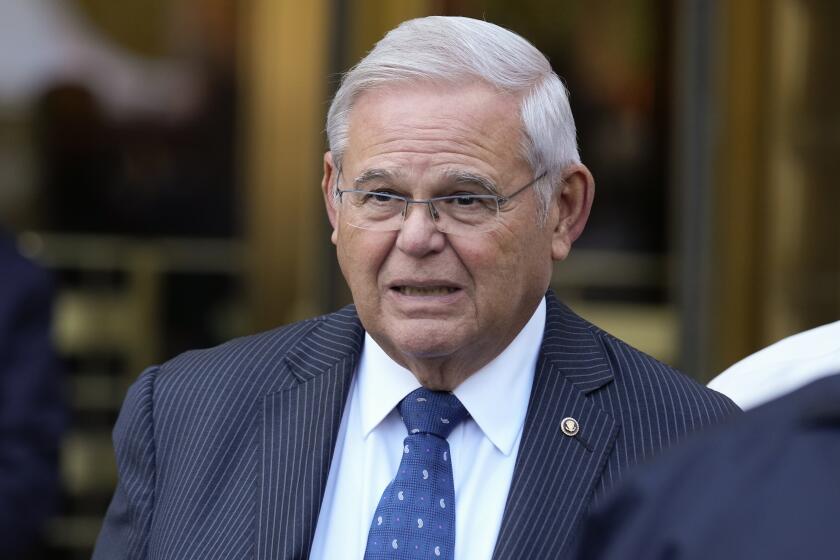Ex-Farrakhan Aide Brings His War of Words to L.A. : Race: Khallid Abdul Muhammad’s statements about blacks, Jews and Arabs have been denounced nationwide as venomous incitements to hatred. He calls himself a ‘truth terrorist.’
He says he’s a teacher. He says he’s at war.
But most black and white leaders tend to describe Khallid Abdul Muhammad with words like these: repugnant, vile, anti-Semitic.
Muhammad, the 43-year-old former senior aide to Louis Farrakhan, head of the Nation of Islam, became more controversial than his mentor for remarks at a Nov. 29 speech at Kean College in New Jersey. He said that Jews and Arabs were “the bloodsuckers of the black nation and the black community.” He called Pope John Paul II a “cracker”; he suggested that Jewish people brought on the Holocaust themselves.
Now he has come to Los Angeles, where he grew up and where he will speak Saturday night--his first address here since the speech that made him infamous.
In an interview Thursday, with his 9-year-old son, Farrakhan Khallid Muhammad, constantly at his side in a borrowed office in the Crenshaw district, Muhammad reflected on his critics.
There are many. Not only was his speech denounced by the President, the Congressional Black Caucus, the Rev. Jesse Jackson, and leading black and Jewish leaders, but Farrakhan himself was forced to reprimand Muhammad and suspend him from his duties as a top aide and spokesman. “He said my speech was vile in manner, repugnant, malicious, mean-spirited, and spoken in mockery of individuals and people and not in the spirit of Islam. I will never forget those words,” Muhammad said. “I feel very hurt over those words, to be honest.”
(Adding to the controversy, however, Farrakhan said he agreed with the basic truths of what Muhammad had said--just not the way he said it.)
Muhammad, who will speak Saturday night at the Vison Complex theater in the Crenshaw district and Sunday at UC Riverside, gives an average of five speeches a week, for what he says is an average honorarium of $10,000 a speech. And his usual topic is the “black holocaust,” the sufferings of blacks for centuries, before, during and after the American slave trade. Where it gets incendiary is when he begins to compare it to the World War II Holocaust, saying that oppression of blacks has taken far more lives.
The Anti-Defamation League is among his most vocal critics. “I don’t see what’s to be gained by relativizing human tragedy,” said David Lehrer, regional director here of the Anti-Defamation League. “It’s pernicious. . . . My hope is that Khallid Abdul Muhammad doesn’t speak for many black people. He is a divisive separatist who spews forth venom in every direction. Good people in all communities have and will continue to reject the blandishments of this bigot.”
Muhammad does not disavow any of his Kean College remarks, and is likely to touch on the same themes here. In fact, like a politician on the campaign trail, he uses phrases again and again. “I’m a truth terrorist, I’m a knowledge gangster,” he often says.
On Saturday night, he promises, “I will name the names of the Jews in all of the major networks who have great control and influence over all the negative images of blacks in movies and television and the media in general.”
Ask him why he measures which is worse, black suffering or the Holocaust, and he replies without raising his voice, “That is such a ridiculous question to ask me. We never made it an issue. It’s the so-called Jews who make it an issue. . . . The Jews believe they have a corner on suffering.”
The venom and vitriol of most of his speeches tend to overshadow any lessons about black oppression that he has to offer. But he doesn’t really care who is offended. White, Jewish, Catholic, Arab critics--they’re among the oppressors of blacks. Black critics are brainwashed or “house niggers.”
All this is said calmly, quietly during the interview. In speeches, he is commanding, theatrical. But here, he rarely raises his voice. He is articulate, if sometimes given to making small speeches that quote a blur of sources from historical writings to the Bible.
He arrives with an entourage of security, but his son is his most ardent observer. Farrakhan listens raptly, scrutinizing his father and his father’s interviewer. He stands when his father is ready to leave, gets papers for him from his bag when his father requests them.
Muhammad, who is divorced from his son’s mother, refers to her only as a member of the Nation of Islam, “a very brilliant African queen.”
Muhammad is reluctant to reveal many of the details of his life or boyhood in Los Angeles. He spent his childhood between Texas--where he was born Harold Moore Vann--and Los Angeles, where he still has close ties. He says he has a doctorate in sociology but he declines to name the university where he earned it, saying his Ph.D. from a white institution means little to him. (Other news accounts say he attended Dillard University in New Orleans, and put his age at 48.)
He does say that he grew disenchanted with traditional academia and eventually took up the work of the Nation of Islam after meeting Farrakhan in New Orleans in 1967. In 1988, while living in Atlanta, Muhammad was convicted of using a false Social Security number on a home mortgage loan application, and served one year in prison. He now lives in New York and spends most of his time traveling and making speeches.
If they offend people, he says, so be it. “If you’re at war, you’re supposed to attack your enemies. It’s arrogant to tell the aggrieved, to tell the victim, to tell the survivor of the African holocaust how to suffer or how to talk.”
More to Read
Start your day right
Sign up for Essential California for news, features and recommendations from the L.A. Times and beyond in your inbox six days a week.
You may occasionally receive promotional content from the Los Angeles Times.







